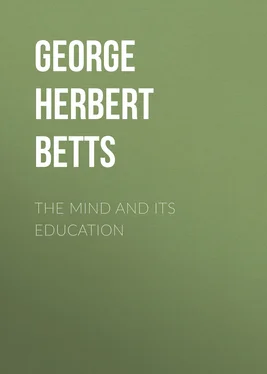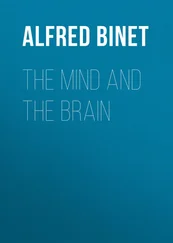George Herbert Betts - The Mind and Its Education
Здесь есть возможность читать онлайн «George Herbert Betts - The Mind and Its Education» — ознакомительный отрывок электронной книги совершенно бесплатно, а после прочтения отрывка купить полную версию. В некоторых случаях можно слушать аудио, скачать через торрент в формате fb2 и присутствует краткое содержание. Жанр: foreign_edu, pedagogy_book, foreign_psychology, на английском языке. Описание произведения, (предисловие) а так же отзывы посетителей доступны на портале библиотеки ЛибКат.
- Название:The Mind and Its Education
- Автор:
- Жанр:
- Год:неизвестен
- ISBN:нет данных
- Рейтинг книги:3 / 5. Голосов: 1
-
Избранное:Добавить в избранное
- Отзывы:
-
Ваша оценка:
- 60
- 1
- 2
- 3
- 4
- 5
The Mind and Its Education: краткое содержание, описание и аннотация
Предлагаем к чтению аннотацию, описание, краткое содержание или предисловие (зависит от того, что написал сам автор книги «The Mind and Its Education»). Если вы не нашли необходимую информацию о книге — напишите в комментариях, мы постараемся отыскать её.
The Mind and Its Education — читать онлайн ознакомительный отрывок
Ниже представлен текст книги, разбитый по страницам. Система сохранения места последней прочитанной страницы, позволяет с удобством читать онлайн бесплатно книгу «The Mind and Its Education», без необходимости каждый раз заново искать на чём Вы остановились. Поставьте закладку, и сможете в любой момент перейти на страницу, на которой закончили чтение.
Интервал:
Закладка:
Parallel with opportunities for proper stimuli and response the nervous system must possess good tonicity , or vigor. This depends in large degree on general health and nutrition, with freedom from overfatigue. No favorableness of environment nor excellence of training can result in an efficient brain if the nerve energy has run low from depleted health, want of proper nourishment, or exhaustion.
The Influence of Fatigue.—Histologists find that the nuclei of nerve cells are shrunk as much as fifty per cent by extreme fatigue. Reasonable fatigue followed by proper recuperation is not harmful, but even necessary if the best development is to be attained; but fatigue without proper nourishment and rest is fatal to all mental operations, and indeed finally to the nervous system itself, leaving it permanently in a condition of low tone, and incapable of rallying to strong effort. For rapid and complete recuperation the cells must have not only the best of nourishment but opportunity for rest as well.
Extreme and long-continued fatigue is hostile to the development and welfare of any nervous system, and especially to that of children. Not only does overfatigue hinder growth, but it also results in the formation of certain toxins , or poisons, in the organism, which are particularly harmful to nervous tissue. It is these fatigue toxins that account for many of the nervous and mental disorders which accompany breakdowns from overwork. On the whole, the evil effects from mental overstrain are more to be feared than from physical overstrain.
The Effects of Worry.—There is, perhaps, no greater foe to brain growth and efficiency than the nervous and worn-out condition which comes from loss of sleep or from worry. Experiments in the psychological laboratories have shown that nerve cells shrivel up and lose their vitality under loss of sleep. Let this go on for any considerable length of time, and the loss is irreparable; for the cells can never recuperate. This is especially true in the case of children or young people. Many school boys and girls, indeed many college students, are making slow progress in their studies not because they are mentally slow or inefficient, not even chiefly because they lose time that should be put on their lessons, but because they are incapacitating their brains for good service through late hours and the consequent loss of sleep. Add to this condition that of worry, which often accompanies it from the fact of failure in lessons, and a naturally good and well-organized nervous system is sure to fail. Worry, from whatever cause, should be avoided as one would avoid poison, if we would bring ourselves to the highest degree of efficiency. Not only does worry temporarily unfit the mind for its best work, but its evil results are permanent, since the mind is left with a poorly developed or undone nervous system through which to work, even after the cause for worry has been removed and the worry itself has ceased.
Not only should each individual seek to control the causes of worry in his own life, but the home and the school should force upon childhood as few causes for worry as may be. Children's worry over fears of the dark, over sickness and death, over prospective but delayed punishment, over the thousand and one real or imaginary troubles of childhood, should be eliminated so far as possible. School examinations that prey on the peace of mind, threats of failure of promotion, all nagging and sarcasm, and whatever else may cause continued pain or worry to sensitive minds should be barred from our schoolroom methods and practice. The price we force the child to pay for results through their use is too great for them to be tolerated. We must seek a better way.
The Factors in Good Nutrition.—For the best nutrition there is necessity first of all plenty of nourishing and healthful food. Science and experience have both disproved the supposition that students should be scantily fed. O'Shea claims that many brain workers are far short of their highest grade of efficiency because of starving their brains from poor diet. And not only must the food be of the right quality, but the body must be in good health. Little good to eat the best of food unless it is being properly digested and assimilated. And little good if all the rest is as it should be, and the right amount of oxidation does not go on in the brain so as to remove the worn-out cells and make place for new ones. This warns us that pure air and a strong circulation are indispensable to the best working of our brains. No doubt many students who find their work too hard for them might locate the trouble in their stomachs or their lungs or the food they eat, rather than in their minds.
5. PROBLEMS FOR INTROSPECTION AND OBSERVATION
1. Estimate the mental progress made by the child during the first five years and compare with that made during the second five years of its life. To do this make a list, so far as you are able, of the acquisitions of each period. What do you conclude as to the importance of play and freedom in early education? Why not continue this method instead of sending the child to school?
2. Which has the better opportunity for sensory training, the city child or the country child? For social training? For motor development through play? It is said by specialists that country children are not as good players as city children. Why should this be the case?
3. Observe carefully some group of children for evidences of lack of sensory training (Interest in sensory objects, skill in observation, etc.). For lack of motor training (Failure in motor control, awkwardness, lack of skill in play, etc.). Do you find that general mental ability seems to be correlated with sensory and motor ability, or not?
4. What sensory training can be had from (1) geography, (2) agriculture, (3) arithmetic, (4) drawing? What lines of motor training ought the school to afford, (1) in general, (2) for the hand, (3) in the grace and poise of carriage or bearing, (4) in any other line? Make observation tests of these points in one or more school rooms and report the results.
5. Describe what you think must be the type of mental life of Helen Keller. (Read "The World I Live In," by Helen Keller.)
6. Study groups of children for signs of deficiency in brain power from lack of nutrition. From fatigue. From worry. From lack of sleep.
CHAPTER V
Habit is our "best friend or worst enemy." We are "walking bundles of habits." Habit is the "fly-wheel of society," keeping men patient and docile in the hard or disagreeable lot which some must fill. Habit is a "cable which we cannot break." So say the wise men. Let me know your habits of life and you have revealed your moral standards and conduct. Let me discover your intellectual habits, and I understand your type of mind and methods of thought. In short, our lives are largely a daily round of activities dictated by our habits in this line or that. Most of our movements and acts are habitual; we think as we have formed the habit of thinking; we decide as we are in the habit of deciding; we sleep, or eat, or speak as we have grown into the habit of doing these things; we may even say our prayers or perform other religious exercises as matters of habit. But while habit is the veriest tyrant, yet its good offices far exceed the bad even in the most fruitless or depraved life.
1. THE NATURE OF HABIT
Many people when they speak or think of habit give the term a very narrow or limited meaning. They have in mind only certain moral or personal tendencies usually spoken of as one's "habits." But in order to understand habit in any thorough and complete way we must, as suggested by the preceding paragraph, broaden our concept to include every possible line of physical and mental activity. Habit may be defined as the tendency of the nervous system to repeat any act that has been performed once or many times .
Читать дальшеИнтервал:
Закладка:
Похожие книги на «The Mind and Its Education»
Представляем Вашему вниманию похожие книги на «The Mind and Its Education» списком для выбора. Мы отобрали схожую по названию и смыслу литературу в надежде предоставить читателям больше вариантов отыскать новые, интересные, ещё непрочитанные произведения.
Обсуждение, отзывы о книге «The Mind and Its Education» и просто собственные мнения читателей. Оставьте ваши комментарии, напишите, что Вы думаете о произведении, его смысле или главных героях. Укажите что конкретно понравилось, а что нет, и почему Вы так считаете.












![Edward Ellis - Adrift on the Pacific - A Boys [sic] Story of the Sea and its Perils](/books/753342/edward-ellis-adrift-on-the-pacific-a-boys-sic-s-thumb.webp)